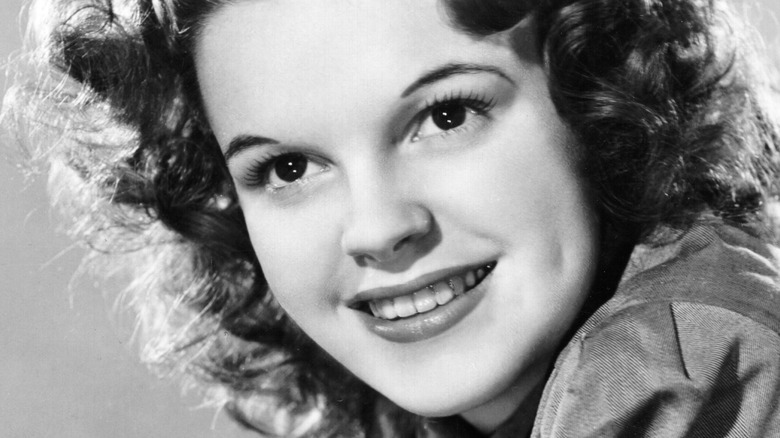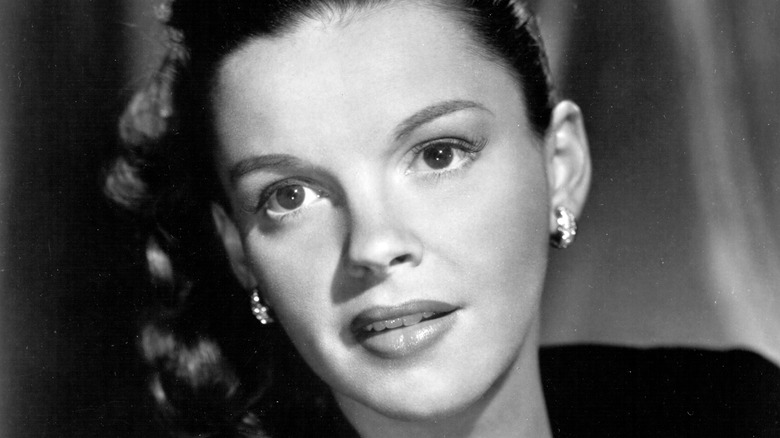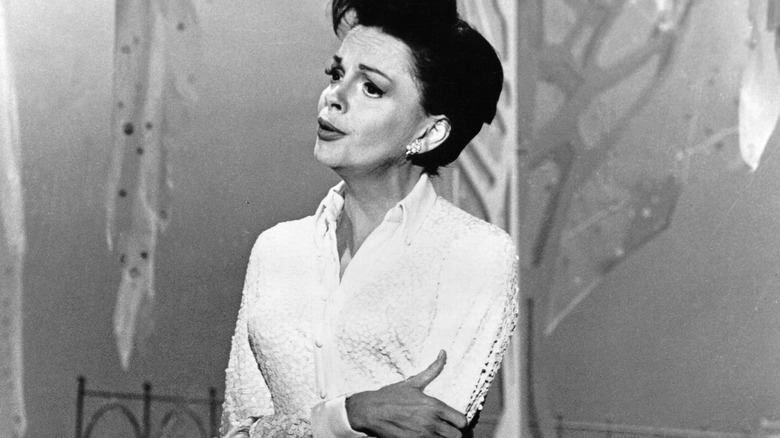Disturbing Things Judy Garland Had To Do For Her Role In The Wizard Of Oz
"The Wizard of Oz," which IMDb reports was released in 1939, remains one of the most popular and beloved films of all time. The film's star, Judy Garland, who was only 16 years old at the time, mesmerized audiences with her incredible acting and singing talent. In the film, Garland's character Dorothy is swept away from her home in rural Kansas to the magical land of Oz during a tornado. While in Oz, Dorothy meets a variety of fascinating characters as she tries to find her way back home. Although she faces adversity along the way, the film has a happy ending, and Dorothy concludes her adventure unscathed.
However, Judy Garland's experience prior to and during production of the film was far from magical, and the misery she endured would leave a negative impression on the teen for the rest of her life.
As reported by Daily Mail, MGM studio executives were impressed with Garland's singing, but they noted several "flaws" in her appearance, which they sought to change or obscure during filming. One of the biggest issues was the fact that Dorothy was supposed to be 8 years old.
TVOM reports the MGM executives thought Garland's appearance was too developed and mature for a younger girl. Therefore, they taped her breasts down to make her appear younger. As reported by Daily Mail, they also forced her to wear a tight corset and the costume designers made a wig, which had pigtails that hung over her chest to further obscure her breasts.
Judy Garland was forced to lose weight
As reported by Daily Mail, producer Mervyn LeRoy hired a personal fitness trainer to make sure Judy Garland maintained a regular exercise regime and ordered her to go on a restrictive diet, so she would not gain any weight. However, Garland was reluctant to follow the strict diet and would often binge on her favorite foods when she had an opportunity. Biography reports studio executives began referring to the teen as a "fat little pig with pigtails."
In an attempt to further suppress her appetite, the teen was prescribed controversial diet pills. As reported by Daily Mail, Dexedrine was a newer medication, which was used to treat a variety of issues, including depression, narcolepsy, and obesity. However, as it was a stimulant, Dexedrine was known to be addictive. It also had a number of adverse side effects, including insomnia. Although the Dexedrine increased Garland's energy levels, and suppressed her appetite, it also prevented her from sleeping. To counteract the insomnia, she was prescribed sleeping pills.
Express reports the teen was also encouraged to smoke as many as 80 cigarettes per day to curb her appetite and help her lose more weight. In addition to the cigarettes, her diet was eventually limited to black coffee and chicken soup. According to reports, Garland was closely watched and "severely reprimanded" if she strayed from her diet or gained any weight.
Judy Garland was forced to alter her appearance
MGM was also concerned about the appearance of Judy Garland's teeth and nose. As reported by Independent, she was forced to wear caps on her teeth to hide the fact that some of her teeth were misaligned, and also had to wear rubber discs in her nose to change its shape while filming.
Although it was not entirely positive, the attention Garland received on set led to animosity between her and her co-stars. Express reports Ray Bolger, who played the scarecrow, Bert Lahr, who played the cowardly lion, Jack Haley, who played the tin man, and Frank Morgan, who played the Wizard of Oz, all shunned her while the movie was being filmed.
As reported by Showbiz CheatSheet, the directors also seemed to resent the teen. During the filming of a scene with Lahr, Garland started giggling and could not stop. Director Viktor Fleming reportedly became so frustrated with Garland that he actually struck her in the face.
The Sun reports Garland was also assaulted by the actors who play the "munchkins" on the set of "The Wizard of Oz." In his memoir, Garland's former husband Sidney Luft said the men, who were much older than the teen, "thought they could get away with anything because they were so small. They would make Judy's life miserable on set by putting their hands under her dress."
The beginning of Judy Garland's downfall
Despite the cruel treatment she received, Judy Garland's performance in "The Wizard of Oz" gained widespread critical acclaim and helped secure the film's legendary status. However, the film has also been cited as the best performance of Garland's career, as well as the beginning of her eventual downfall.
In addition to fueling her addiction to drugs and alcohol, Far Out Magazine reports her time filming "The Wizard of Oz" negatively impacted the teen's already low self-esteem and was a detriment to her mental health. PBS reports Garland was heavily addicted to drugs and alcohol before she reached the age of 30, and her addictions began to negatively impact her acting ability. In 1949, she was cast as the lead in "Annie Get Your Gun." However, she was fired after one month of filming for repeated tardiness and showing up to work visibly intoxicated.
Garland sought treatment at the Peter Bent Brigham Hospital, and was cast in several films, including "Summer Stock" and "Royal Wedding" following her release. However, PBS reports she continued to struggle. Citing excessive absenteeism and tardiness, Garland was ultimately fired by MGM.
Although Garland continued performing for the remainder of her life, she had a number of health concerns related to her drug and alcohol use, and struggled with mental health issues. PBS reports Garland died on June 22, 1969, at the age of 47. Her official cause of death was "Barbiturate poisoning (quinabarbitone) incautious self-overdosage. Accidental."
If you or anyone you know is struggling with addiction issues, help is available. Visit the Substance Abuse and Mental Health Services Administration website or contact SAMHSA's National Helpline at 1-800-662-HELP (4357).



